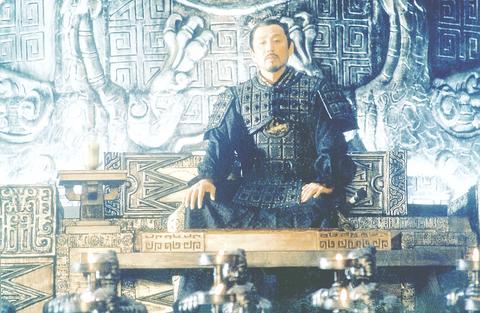The story of those who sought to stop the king of Chin from obliterating the diverse kingdoms that later became China has been told in countless books, plays, operas and films. The films on this subject have attracted China's greatest cinematic talent, but on the whole have failed to amount to much. Hero, which opens in Taiwan today, sees another of China's great directors bite the dust in dealing with this same subject.
Zhang Yimou's (

PHOTO: FOX
Hero is certainly something to look at, with two of Hong Kong's most charismatic stars, Maggie Cheung (

PHOTO: FOX
The story opens with Nameless (Jet Li), a sword fighter, entering the grand and forbidding palace of the king of Chin. The starkness of the hall represents the severity of Chin's law, and the symbolism sets the tone for the rest of the movie, which seems almost purposely to abjure any narrative warmth. Style, we are told in the opening scenes, is everything. The tricks that Zhang first used in Raise the Red Lantern (
And Zhang hasn't gone for anything as mundane as historical accuracy in his first costume epic. There is lots of floating gauze and creatively designed weapons, and the Chin soldiers are subjected to the indignity of shooting off their bows with their feet while sitting on the ground, which Zhang has confessed has absolutely no basis in history. But it may be thought exotic by Western audiences.

PHOTO: FOX
The film's structure follows Akira Kurosawa's classic Rashomon (1950) in that it goes over the same ground a number of times from different perspectives -- in this case, a battle of wits between Nameless and the king as to how Nameless managed to kill off Sky (
Unfortunately you never really care which of the versions presented is the true one because the director fails from the beginning to establish any empathy with the characters.
Which leads to the crucial issue of Zhang's resolution to his martial arts epic. Part of the uniqueness of his approach is that he violates many of the fundamental principles of the chivalric hero character -- apolitical, self-interested, care-free -- in order to achieve a grander vision, which unfortunately pulls the carpet out from under the feet of his "heroes," leaving them looking merely foolish. The end result is not an achievement of some higher state of heroism, but defeat at the hands of a tougher operator. For martial arts movie fans, it is all very unsatisfactory.
A long exposition about the character "sword," written by Broken Sword and presented to the king by Nameless, only goes further to underline the political and philosophical chaos that Zhang has become embroiled in, but he seems content to allow the Chinese "culture" of the whole thing to override any need for logical coherence.
Zhang's attempt to transform the selfish individualism of martial arts fighters into a superficial universal love kills all the glamor and fascination of the chivalric spirit. The freedom that characters like Nameless, Snow and Broken Sword are supposed to represent gets all twisted up into a tool of a political exposition.
But all this does not become clear until late in the film, which gets bogged down in its Rashomon structure, telling and retelling the story, leaving very little room for character development. This superficiality is embodied in the character of Moon, played by Zhang Ziyi, who is little more than a face and a clothes rack.
Unfortunately, this is almost the case with Tony Leung and Maggie Cheung as well. Fans of In the Mood for Love can only feel pity for the two great actors wasting their talent on such two-dimensional characters.
The most impressive acting is done by Chen Daoming (
The final scene, showing the king's greatest achievement, the building of the Great Wall -- and all it represents -- can only make one laugh at its total lack of subtlety.
Not only has Zhang compromised the spirit of the chivalric hero, he seems to have compromised his own integrity as well.
Hero
Directed by: Zhang Yimou
Starring: Maggie Cheung (Snow), Jet Li
(Nameless), Tony Leung Chiu Wai (Broken Sword), Zhang Ziyi (Moon), Donnie Yen (Sky)
and Chen Daoming (King of Chin)
Running time: 120 minutes
Taiwan Release: Today
Language: In Chinese with English subtitles

In the March 9 edition of the Taipei Times a piece by Ninon Godefroy ran with the headine “The quiet, gentle rhythm of Taiwan.” It started with the line “Taiwan is a small, humble place. There is no Eiffel Tower, no pyramids — no singular attraction that draws the world’s attention.” I laughed out loud at that. This was out of no disrespect for the author or the piece, which made some interesting analogies and good points about how both Din Tai Fung’s and Taiwan Semiconductor Manufacturing Co’s (TSMC, 台積電) meticulous attention to detail and quality are not quite up to

April 21 to April 27 Hsieh Er’s (謝娥) political fortunes were rising fast after she got out of jail and joined the Chinese Nationalist Party (KMT) in December 1945. Not only did she hold key positions in various committees, she was elected the only woman on the Taipei City Council and headed to Nanjing in 1946 as the sole Taiwanese female representative to the National Constituent Assembly. With the support of first lady Soong May-ling (宋美齡), she started the Taipei Women’s Association and Taiwan Provincial Women’s Association, where she

Chinese Nationalist Party (KMT) Chairman Eric Chu (朱立倫) hatched a bold plan to charge forward and seize the initiative when he held a protest in front of the Taipei City Prosecutors’ Office. Though risky, because illegal, its success would help tackle at least six problems facing both himself and the KMT. What he did not see coming was Taipei Mayor Chiang Wan-an (將萬安) tripping him up out of the gate. In spite of Chu being the most consequential and successful KMT chairman since the early 2010s — arguably saving the party from financial ruin and restoring its electoral viability —

It is one of the more remarkable facts of Taiwan history that it was never occupied or claimed by any of the numerous kingdoms of southern China — Han or otherwise — that lay just across the water from it. None of their brilliant ministers ever discovered that Taiwan was a “core interest” of the state whose annexation was “inevitable.” As Paul Kua notes in an excellent monograph laying out how the Portuguese gave Taiwan the name “Formosa,” the first Europeans to express an interest in occupying Taiwan were the Spanish. Tonio Andrade in his seminal work, How Taiwan Became Chinese,